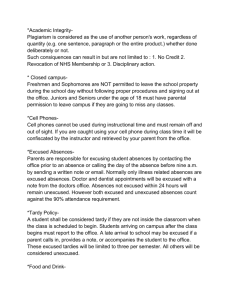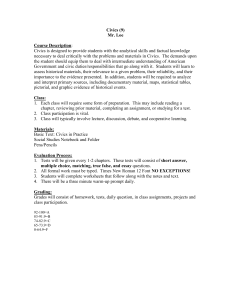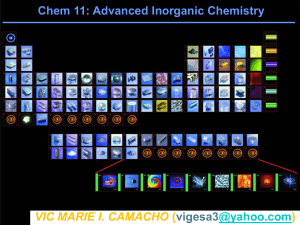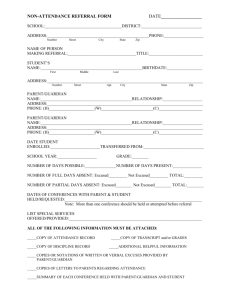Fall 2013 CJ 200: Introduction to Criminal Justice
advertisement
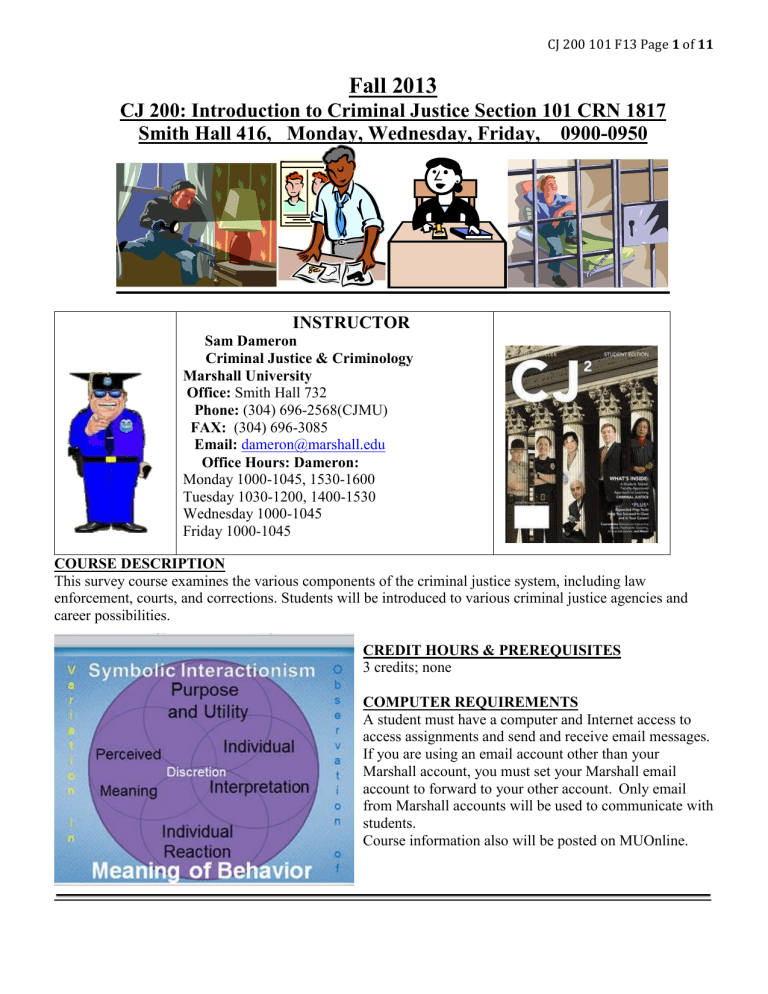
CJ 200 101 F13 Page 1 of 11 Fall 2013 CJ 200: Introduction to Criminal Justice Section 101 CRN 1817 Smith Hall 416, Monday, Wednesday, Friday, 0900-0950 INSTRUCTOR Sam Dameron Criminal Justice & Criminology Marshall University Office: Smith Hall 732 Phone: (304) 696-2568(CJMU) FAX: (304) 696-3085 Email: dameron@marshall.edu Office Hours: Dameron: Monday 1000-1045, 1530-1600 Tuesday 1030-1200, 1400-1530 Wednesday 1000-1045 Friday 1000-1045 COURSE DESCRIPTION This survey course examines the various components of the criminal justice system, including law enforcement, courts, and corrections. Students will be introduced to various criminal justice agencies and career possibilities. CREDIT HOURS & PREREQUISITES 3 credits; none COMPUTER REQUIREMENTS A student must have a computer and Internet access to access assignments and send and receive email messages. If you are using an email account other than your Marshall account, you must set your Marshall email account to forward to your other account. Only email from Marshall accounts will be used to communicate with students. Course information also will be posted on MUOnline. CJ 200 101 F13 Page 2 of 11 UNIVERSITY POLICIES By enrolling in this course, you agree to the University Policies listed below. Academic Dishonesty Excused Absence Policy for Undergraduates Computing Services Acceptable Use Inclement Weather/ Dead Week Students with Disabilities Academic Forgiveness Academic Probation and Suspension Academic Rights and Responsibilities of Students Affirmative Action/ Sexual Harassment Please read the full text of each policy by going to http://www.marshall.edu/wpmu/academic-affairs/and clicking on “Marshall University Policies.” Or, you can access the policies directly by going to http://www.marshall.edu/academic-affairs/?page_id=802 ATTENDANCE POLICY Attendance will be recorded daily. Missing classes will adversely affect your grade. Material will be covered in class that is not in the book or online EXCUSED ABSENCES Class Attendance “It is Marshall University’s policy that each instructor evaluates the importance of student class attendance. In the course syllabus, the instructor must provide his/her policy on class attendance, make-up work, and related matters. If a student is absent from class because of a circumstance that is included in the excused absence policy, the absence can be handled by an arrangement between the student and the instructor or, if either party requests, the student can obtain an official excused absence following the procedure described below. The instructor must honor a university excused absence covered by this policy and allow the student an opportunity to catch up/make up work missed. This policy excludes those academic endeavors that require the completion of a certain number of clock hours, as in clinical experiences, practica or internships. For those courses, the maximum number of absences will be determined by the department chair or program supervisor. This policy does not supersede program accreditation requirements. Definitions of Excused Absences: Excused absences fall into five categories: 1. University-sponsored activities: 1.Academic activities including, but not limited to, performing arts, debate and individual events, honors classes, ROTC, and departmental functions. 2. Athletics. Official athletic events sponsored by the Athletic Department. 3. Other University activities, including student government and student organizations. The activity must have a clear educational mission and be closely linked to academic pursuits or to other official University functions. 2. Student Illness or Critical Illness/Death in the Immediate Family” Immediate Family” is defined as a spouse/life partner, child, parent, legal guardian, sibling, grandparent or grandchild. CJ 200 101 F13 Page 3 of 11 1. Student Illness or injury: Absences will be excused only for illnesses or injuries that prohibit students from participating in class. 2. Critical Illness of Immediate Family Member: Absences will be excused if the student documents that he or she had to provide needed care and/or support for a critically ill immediate family member. 3. Death of an Immediate Family Member 3. Short-Term Military Obligation: This is defined as absence as the result of military orders for a short-term period. Note: Students subject to federal activation are covered by a separate policy. Please see the catalog for this policy. 4. Jury Duty or Subpoena for Court Appearance: This applies to absences that are a result of official requests from a court of law. 5. Religious Holidays: This applies to religious holidays. Process to Secure an Excused Absence The student who seeks an excused absence must do so immediately after the event/activity/incident by following these guidelines. Whenever time permits, such as for University activities scheduled well in advance, the excuse must be obtained and presented to the instructor prior to the absence. 1. University Sponsored Activities: 1. Academic Activities: These absences are excused by the dean within whose unit the activity is sponsored. The dean must pre-approve any notice that is given or sent to faculty regarding absences of this type. 2. Athletics: These absences are excused by the Provost/Senior Vice President for Academic Affairs who must preapprove any notice given/sent to faculty. 3. Other University activities: These absences are pre-approved by the Dean of Student Affairs and excused by the Office of Academic Affairs prior to any notice to faculty. The activity and the excused absence must be endorsed in writing by the organization advisor. 2. Student Illness or Critical Illness/Death in the Immediate Family: 1. Student Illness or Injury: The student must submit official documentation of treatment by a medical practitioner to the Dean of Student Affairs as soon as he/she returns to class. Documentation must specify the inclusive dates to be excused. The dean will notify faculty that the absence(s) meets the criteria to be excused. 2. Critical Illness of Immediate Family Member: The student must submit official documentation from the family member’s health care provider that substantiates the critical nature of the illness and the student’s need to provide the care/support. This documentation is to be submitted to the Dean of Student Affairs upon the student’s return to class. The dean will notify faculty that the absence(s) meets the criteria to be excused. 3. Death of an Immediate Family Member: To obtain an excused absence, the student must submit one of the following to the Dean of Student Affairs upon return to classes: an obituary or a funeral program with the student named as a relative; verification on letterhead stationery of the death and the relationship by clergy or funeral home personnel. The dean will notify faculty that the absence meets the criteria to be excused. 3. Short-Term Military Obligation: The student who seeks an excused absence for military obligation must present official documentation of his/her orders to duty to the dean of his/her college prior to the absence. The dean will notify faculty that the absences are to be excused. CJ 200 101 F13 Page 4 of 11 4. Jury Duty or Subpoena for Court Appearance: The student who seeks an excused absence for jury duty or court appearance must submit his/her subpoena or official notification of jury duty to the dean of his/her college prior to the date of the obligation. The dean will notify faculty that the absence is to be excused. 5. Religious Holidays: Absences resulting from religious holidays will be excused when the student presents the request in advance of the absence to the Dean of Student Affairs. The dean will indicate his/her approval on the request and forward it to the Office of Academic Affairs for the official excused absence notification to faculty. Notice: Any student who falsifies information or documentation in order to obtain an excused absence has committed a violation of the Code of Student Rights and Responsibilities and will be referred to Judicial Affairs for appropriate sanctions. Process to Catch Up/Make Up Missed Work 1. It is the responsibility of the student to request an opportunity to complete missed work. 2. Once the excused absence has been secured, the request to make up work should be made to the instructor at the next available class meeting. 3. Missed activities will be rescheduled or, in the event that rescheduling of an activity is not practical or possible, a fair and equitable alternative way of arriving at the grade for the missed component of the overall grade will be developed by the instructor. 4. Punitive measures must not be taken against students who present an official University excused absence. 5. Students should be aware that excessive absences—whether excused or unexcused—may affect their ability to earn a passing grade. 6. If the faculty member believes that the number of absences accrued under the terms of this policy is such that the student cannot fulfill the learning experience/mastery that a course requires, he/she may recommend that a student withdraw from the class. Regardless of the nature of the excused absence, the student is responsible for completing all coursework prior to the end of the semester.” Additional Attendance Policy for this Class Role will be called at the beginning of class if you are not there when your name is called you are absent and will not be counted as present if you come up and ask me to count you present. If you miss an exam, quiz, or assignment with no legitimate documented excuse, a zero will be given for that requirement with no makeup. For those students who have a legitimate documented excuse (as defined in the preceding paragraphs), an alternative time to take the exam, quiz or turn in an assignment will be determined. The format of the make-up exams/quiz/assignment will be left to my discretion. In addition, students who are late on exam day will not be permitted to take the exam if another student(s) already has completed the exam and has left the classroom; the exam in this case has been compromised. In other words, you will NOT be able to take the exam or take a make-up exam. CJ 200 101 F13 Page 5 of 11 If you are excused by the Dean of Student Affairs for missing class, you must make up the work due. If a paper or assignment was due during your excused absence, you must turn in the assignment within one week of the excuse’s end. If a test or quiz was missed, you must make arrangements to make up the test or quiz within one week of the end of the excused absence. Failure to make up the examination or quiz at the agreed time will result in a zero for the examination, quiz, or assignment. DESIRED LEARNER OUTCOMES Course Student Learning Outcomes How students will practice each outcome in this Course How student achievement of each outcome will be assessed in this Course Quizzes Final Examination Writing Assignments Students will Define/Identify Terms in CJS. Question and Answer Sessions Class Discussion Flash Cards Beat the Clock Accessing Media Library Students will Describe Components of CJS. Question and Answer Sessions Class Discussion Flash Cards Beat the Clock Accessing Media Library Quizzes Exams Writing Assignments Students will Explain Roles of CJS. Question and Answer Sessions Class Discussion Flash Cards Beat the Clock Accessing Media Library Practical Exercises which prepare students to Complete real world artifacts including an Information, arrest warrant, and PSI Police Report Information PSI Exams Quizzes Writing Assignments Students will Differentiate Practices of CJS. Question and Answer Sessions Class Discussion Flash Cards Beat the Clock Accessing Media Library Accessing Career in Criminal Justice Practical Exercises which prepare students to Complete real world artifacts including a police report, an Information, and PSI Police Report Information PSI Exams Quizzes Writing Assignments These Course Objectives are designed to meet the Criminal Justice and Criminology Objective 1. “Differentiate Among Criminal Justice System Components, Roles, and Practices--Students will define and properly use specialized terms to describe, explain, and differentiate the components, roles, and practices of the criminal justice system. (Specialized Knowledge-1., 2.)” CJ 200 101 F13 Page 6 of 11 REQUIRED COURSE MATERIAL CJ2 by Larry Gaines & Roger Miller (2013). ISBN# 9781111840877 Note: This is a one-time use book and access code. In other words, you cannot return or sell back this text as it contains an online access code that can be used only once. However, its price (approx. $55) is only about a third of what a normal textbook in this course would cost. When purchasing this material, make sure you are getting a “new” copy. You should only purchase this material from the MU Bookstore or from the publisher. DO NOT purchase it from anyone else online, because there is no guarantee that the access code has not already been activated. Be aware that some bookstores may list it as available “Used” or for “Rental,” but it CANNOT without the code already having been used. This course material is required and can be purchased at The Marshall University Bookstore or directly from Cengage Publishing using the following link: http://www.cengagebrain.com/shop/ISBN/9781111840877 It is expected that you will have the book and code from the first day of class, so I will not accept the excuse that you were waiting for the material to arrive in the mail. This bundle includes a traditional textbook and an online access code card which provides access to an e-version of the textbook and numerous online activities that go along with the class material. Therefore, the entire bundle is required as the real learning material for this course is not the book, but rather the online and interactive activities found in “CourseMate” (see below for description). If you happen to be repeating this course from a previous semester, note that this material may be different than what was used previously, depending on when you took the class. In that case, you will need to purchase this new material to successfully complete the course. Please note that the publisher does offer the option of purchasing a stand-alone access code to CourseMate for immediate use. This option WILL NOT include a printed textbook, but rather only access to the e-book and online material. I leave it to your discretion if you choose to purchase the instant access code only. The obvious advantage is that you will get immediate access to the e-version of the book, and you can get started on the course without delay. If you are buying the material at the last minute, this may be a better option for you. However, the drawback is that you will not have a printed copy of the book. In this case, if you have internet or computer malfunctions, it may prevent you from accessing the material when necessary. Therefore, you are choosing this option at your own risk. Personally, I would rather have the bundle as I like to read from a physical book, as do many students. Regardless of which option above you choose, if the MU bookstore runs out of copies, you will need to buy the material using the publisher’s website. In my opinion, the MU Bookstore is still the best option overall. It provides less hassle and returns are more convenient. What is CourseMate? Much of the substantive information for this course can be found through the interactive modules in CourseMate. In essence, the CourseMate website is just as important as the textbook. Research evidence indicates that learners today are more visual, hence this format has been deemed a more reliable method of retaining information than simply reading a book. The registration process for CourseMate is very simple; just follow the step-by-step directions provided with the access code card that came with your book. Once you have successfully created your account and entered CourseMate, take some time to familiarize yourself with the environment. Within each topic, you will find various activities such as Learning Modules, Animations, Beat the Clock Games, Simulations, Interactive Quizzes, Glossaries and more. While I would like you to complete all of these activities for your own benefit, the interactive quizzes are of most importance here. Even though you will be receiving scores for these quizzes within CourseMate, I will NOT be using them toward your grade in this class. They are for your benefit only, and can be taken an unlimited CJ 200 101 F13 Page 7 of 11 number of times. Furthermore, I strongly urge you to use the glossaries when reviewing for quizzes and exams. READING/ONLINE ASSIGNMENTS Reading/online assignments can be found on the tentative course schedule at the end of this syllabus. They are meant to reinforce the class lectures and discussions, and it is expected that they will be completed prior to class, Furthermore, there will be corresponding online activities you can do to improve your understanding of the course material. PAPER GUIDELINES There are no major papers for this course GRADING POLICIES Grades Approximate Weight % Criteria Examinations Exam 1 Exam 2 Exam 3 Exam 4 (only 3 Count) Comprehensive Term Exam Total 175 Points 175 Points 175 Points 175 Points 100 Points 625 Points 17.5 17.5 17.5 17.5 10 62.5 Real World Artifacts Police Report Information/Sentences Presentence Investigation Total 100 Points 100 Points 100 Points 300 Points 10 10 10 30 Scale 900-1000 A 800-899 B 700-799 C 600-699 D Below 600 F 75 Points 7.5 Quizzes/Assignments Additional quizzes/assignments may be given and the points used for tests if necessary to promote student learning. TOTAL 1000 100% Grade Inquiries Student materials will be returned as soon as graded to the student. If the student has a question about a grade on an assignment, the student must bring the assignment to the professor. No grade inquiries about specific assignments will be explored without the questioned assignment. It is the student's responsibility to keep their materials. Final examinations and materials not picked up will be kept in my office for 30 days into the next semester. A student may pick up their final examination and other materials after grades are turned in for the semester until thirty days into the next regular semester. At that time, finals and all other material not claimed will be destroyed. CJ 200 101 F13 Page 8 of 11 TENETS OF ATTENDANCE 1. Students should attend and participate in class. A student should recognize that one of the most important aspects of a college education is classroom attendance and participation. The value of this part of the academic experience cannot be fully measured by testing procedures. You should attend all classes and be here on time. Attendance will be taken at the beginning of class, if you are late you will not be counted present. 2. When students attend classes, they are in a position to make significant contributions to their learning experiences and the learning experiences of other students by asking relevant questions, making pertinent observations, and sharing information. When a student misses class, the student and the class both suffer from a missed opportunity to exchange information and promote the learning process. 3. Students will be held accountable for all requirements and information covered in all classes, whether or not they attend. If it becomes necessary to give additional quizzes to spur attendance or learning, quizzes may be given and their results applied to any test scores. 4. If a student comes late to take an examination their paper will be taken when the assigned test conclusion time is reached, the student will not receive an extension to complete the examination. During testing sessions, once any student has completed the test and left the classroom no student will be allowed to take the test and any student who comes to take the test after a student has left the classroom will receive a zero for the examination/quiz. 5. The Criminal Justice Department is not a print shop. If you are having trouble with your printer, you may email the assignment to me as proof that you have completed the assignment. At that point, no changes can be made to the assignment; to make changes would be academic dishonesty. You must print out the paper and bring it to me at the next class period. When emailing, be careful what you title your attachments because the spam blocker could block your message. If you do not get a reply from me about your paper/assignment, I probably didn’t get it. It is your responsibility to make sure I receive it. 6. Phone Behavior. (Cell Phones, Pagers, etc.) Turn them off, or on vibrate, when you get to class. If it goes off, you can be penalized five points per occurrence. If you have an emergency situation, let me know and set by the door. When your phone vibrates go into the hall to answer it. No texting, answering or checking texts will be permitted in class. If you do so, you can be penalized five points per occurrence. Also, you should not check to see who is calling or texting you. Such behavior is disruptive to the class and will be treated as if you answered the phone, five points per occurrence. Phones/Texts, Email, phones, etc. checked during tests will result in a zero for the examination. You also cannot listen to music or have earphones on while taking a test, or in class. 7. Computers in class are OK if you are taking notes. If you use your computer to take notes, email them to me at the end of class at dameron@marshall.edu If you do not email them to me, do not use the computer again. If you are emailing, or using the computer for non-class related surfing, your behavior will be counted as phone behavior, see number 6. 8. Classroom demeanor. Civility in class is expected. You must respect the opinions and rights of other students and allow them to participate in class. Be active in discussions, but do not hog them or blurt out answers all the time. Everyone should have a chance to participate in class. CJ 200 101 F13 Page 9 of 11 9. Stupid questions are questions that are not asked. Questions that are asked are not stupid questions and will not be treated as such. If you have a question on class material, ask it. Answer questions during discussions. If you are wrong, I’ll let you know as gently as possible. I won’t make fun of your answer or you. However, make a true effort to answer the question. If you are just trying to be the center of attention and hog the discussions, I’ll let you know before the next class that you are over the top. 10. Communicating with me. You can call my phone number during office hours, or email me at my Marshall Email address. You should email me from your official Marshall Email Account. We are only allowed to send student information to a student’s official email account. In the Subject box, you should put in a description of what you want, like a “Question about CJ 200, 201”, always include the course number and section number. That way, I will know the class and section to which you are referring. Also, use the name you are using on the class roll on all tests, quizzes, exams, and emails so that I will know it is you. 11. I am not an attorney and do not give legal advice. Any legal interpretations in class are mine and should not be considered as legal advice or to be absolutely correct under all circumstances. If you have legal questions, check the state code and/or ask an attorney. 12. I have significant hearing loss, especially in my right ear. I no longer have stereo hearing and can’t tell the direction from which noise comes. Please speak up in class. If I miss what you say it isn’t on purpose. Also, please don’t chat in class with other students, it makes it harder for me to hear what students are saying that pertains to class. COURSE SCHEDULE* Week 1 Aug 26-30 Introduction; Criminal Justice Today, Discretion Skill Prep xii-xxxiv, Chapter 1 Aug 26, Monday -- Aug 30, Friday Late Registration and Schedule Adjustment (Add/Drop) Aug 26, Friday Last Day to Add Classes (Withdrawals Only After This Date) Week 2 Causes of Crime, Chapter 2 Sep 2. Labor Day Holiday (University Closed) Sep 3, Tuesday "W" Withdrawal Period Begins Week 3 Sep 2-6 Sep 2. Labor Day Holiday (University Closed) Sep 9-15 Defining and Measuring Crime, Chapter 3 Week 4 Sep 16-20 Inside Criminal Law, Chapter 4 Exam 1 (Sep 20) CJ 200 101 F13 Page 10 of 11 Week 5 Sep 23-27 Law Enforcement Today, Chapter 5 Sep 27, Friday Last Day to Drop 1st 8 Weeks Courses Week 6 Sep 30-Oct 4 Challenges to Effective Policing, Chapter 6 Week 7 Oct 7-11 Police and the Constitution, Chapter 7 Police Report How to Complete It Oct 11 Police Report Due Week 8 Oct 14-18 Police and the Constitution, Chapter 7 Continued Courts and Quest for Justice, Chapter 8 Oct 15, Wednesday Mid-Semester (1st 8 Weeks Courses End) Oct 16, Thursday 2nd 8 Weeks Courses Begin Oct 17-19 LAE Regionals, Newark DE Week 9 Oct 18 Exam 2 Oct 21-25 Pretrial Procedures, Chapter 9 Oct 21, Monday, Noon Deadline for Submitting Freshmen Mid Term Grades Week 10 Oct 28-Nov 1 The Criminal Trial, Chapter 10 Oct. 28, Mon. Students should schedule appointments with advisors to prepare for advance registration. (Required for students who have mandatory advising holds) Nov. 1, Fri. Last Day to Drop a Full Semester Individual Course Week 11 Nov 4-8 Punishment and Sentencing, Chapter 11 How to Complete an Information Nov. 4, Mon. Recommended Date to Apply for May 2014 Graduation Nov. 4, Mon. – Dec. 6, Fri. Complete Withdrawals Only Week 12 Nov 11-15 Probation and Community Corrections, Chapter 12 Nov 11th Information Nov.11, Mon. – Nov. 22, Fri. Advance Registration for Spring Semester Due for Currently Enrolled Students Nov. 15, Friday Last Day to Drop 2nd 8 Weeks Courses Exam 3 (Nov 15) CJ 200 101 F13 Page 11 of 11 Week 13 Nov 18-22 Prisons and Jails, Chapter 13 Chapter 12 Continued How to Complete a PSI Week 14 Nov 25-30 Thanksgiving/Fall Break Classes Dismissed Week 15 Behind Bars: The Life of an Inmate, Chapter 14 Classes Resume Dec. 2, Mon. -- December 7, Sat. Dead Week Dec. 6, Fri. Last Day to Completely Withdraw for Fall Semester Dec. 7, Sat. Last Class Day Week 16 Dec. 9, Mon. Exam Day Dec. 10, Tue. Exam Day Dec. 11, Wed. Study Day - exams resume at 3:00 pm Dec. 12, Thurs. Exam Day Dec. 13, Fri. Exam Day Dec. 14, Sat. Exam Day - Saturday classes and some common finals Dec 2-6 Dec 4 PSI Due Dec 9-13 Final Exam Friday, December 13 0800-1000 * Presentation schedule may vary due to student interest or comprehension of material. Grade Inquiries Student materials will be returned as soon as graded to the student. If the student has a question about a grade on an assignment, the student must bring the assignment to the professor. No grade inquiries about specific assignments will be explored without the questioned assignment. It is the student's responsibility to keep their materials. Final examinations and materials not picked up will be kept in my office for 30 days into the next semester. A student may pick up their final examination and other materials after grades are turned in for the semester until thirty days into the next regular semester. At that time, finals and all other material not claimed will be destroyed.

